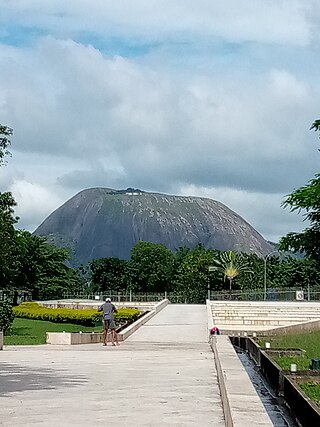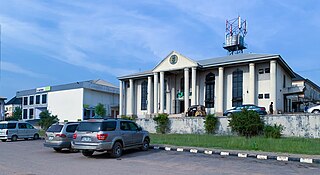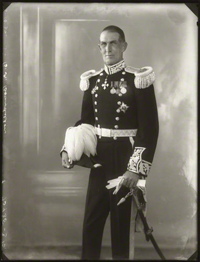
The history of Nigeria can be traced to the earliest inhabitants whose remains date from at least 13,000 BC through early civilizations such as the Nok culture which began around 1500 BC. Numerous ancient African civilizations settled in the region that is known today as Nigeria, such as the Kingdom of Nri, the Benin Empire, and the Oyo Empire. Islam reached Nigeria through the Bornu Empire between and Hausa Kingdom during the 11th century, while Christianity came to Nigeria in the 15th century through Augustinian and Capuchin monks from Portugal to the Kingdom of Warri. The Songhai Empire also occupied part of the region. Through contact with Europeans, early harbour towns such as Calabar, Badagry and Bonny emerged along the coast after 1480, which did business in the transatlantic slave trade, among other things. Conflicts in the hinterland, such as the civil war in the Oyo Empire, meant that new enslaved people were constantly being "supplied".

Onitsha is a city on the eastern bank of the Niger River, in Anambra State, Nigeria. A metropolitan city, Onitsha is known for its river port and as an economic hub for commerce, industry, and education. It is one of the largest metropolitan area in Nigeria with a fast growing population. It hosts the Onitsha Main Market, the largest market in Africa in terms of geographical size and volume of goods. Onitsha and neighboring Asaba on the western bank of the Niger River form a continuous metropolitan area.

Spanish Guinea was a set of insular and continental territories controlled by Spain from 1778 in the Gulf of Guinea and on the Bight of Bonny, in Central Africa. It gained independence in 1968 as Equatorial Guinea.

Southern Nigeria was a British protectorate in the coastal areas of modern-day Nigeria formed in 1900 from the union of the Niger Coast Protectorate with territories chartered by the Royal Niger Company below Lokoja on the Niger River.

The Niger Delta is the delta of the Niger River sitting directly on the Gulf of Guinea on the Atlantic Ocean in Nigeria. It is located within nine coastal southern Nigerian states, which include: all six states from the South South geopolitical zone, one state (Ondo) from South West geopolitical zone and two states from South East geopolitical zone.

Indirect rule was a system of governance used by imperial powers to control parts of their empires. This was particularly used by colonial empires like the British Empire to control their possessions in Africa and Asia, which was done through pre-existing indigenous power structures. Indirect rule was used by various colonial rulers such as: the French in Algeria and Tunisia, the Dutch in the East Indies, the Portuguese in Angola and Mozambique and the Belgians in Rwanda and Burundi. These dependencies were often called "protectorates" or "trucial states". Through this system, the day-to-day government and administration of both small and large areas were left in the hands of traditional rulers, who gained prestige and the stability and protection afforded by the Pax Britannica. Consequentially done at the cost of losing control of their external affairs, and often of taxation, communications, and other matters. It was usually carried out with a small number of European "advisors" effectively overseeing the government of large numbers of people spread over extensive areas.

Colonial Nigeria was ruled by the British Empire from the mid-nineteenth century until 1960 when Nigeria achieved independence. Britain annexed Lagos in 1861 and established the Oil River Protectorate in 1884. British influence in the Niger area increased gradually over the 19th century, but Britain did not effectively occupy the area until 1885. Other European powers acknowledged Britain's dominance over the area in the 1885 Berlin Conference.
Uchechukwu Peter Umezurike, also known as Uche Peter Umez, is a Nigerian author and academic currently working as an assistant professor of English at the University of Calgary. In addition to publishing several works of children’s fiction, short fiction, and poetry, his academic research draws from gender studies and critical race theory to analyze African, African diaspora, postcolonial, and global literatures as well as film.
The Kingdom of Bonny, otherwise known as Grand Bonny, is a traditional state based on the town of Bonny in Rivers State, Nigeria. In the pre-colonial period, it was an important slave trading port, later trading palm oil products. During the 19th century the British became increasingly involved in the internal affairs of the kingdom, in 1886 assuming control under a protectorate treaty. Today the King of Bonny has a largely ceremonial role.
Chief Christopher Alexander Sapara Williams was the first indigenous Nigerian lawyer, called to the English bar on 17 November 1879. In addition to his legal practice, he came to play an influential role in the politics of Nigeria during the colonial era. He held the chieftaincy title of the Lodifi of Ilesha.

Lagos Colony was a British colonial possession centred on the port of Lagos in what is now southern Nigeria. Lagos was annexed on 6 August 1861 under the threat of force by Commander Beddingfield of HMS Prometheus who was accompanied by the Acting British Consul, William McCoskry. Oba Dosunmu of Lagos resisted the cession for 11 days while facing the threat of violence on Lagos and its people, but capitulated and signed the Lagos Treaty of Cession. Lagos was declared a colony on 5 March 1862. By 1872, Lagos was a cosmopolitan trading centre with a population over 60,000. In the aftermath of prolonged wars between the mainland Yoruba states, the colony established a protectorate over most of Yorubaland between 1890 and 1897. The protectorate was incorporated into the new Southern Nigeria Protectorate in February 1906, and Lagos became the capital of the Protectorate of Nigeria in January 1914. Since then, Lagos has grown to become the largest city in West Africa, with an estimated metropolitan population of over 9,000,000 as of 2011.

Sir Walter Egerton, had a long career in the administration of the British Empire, holding senior positions which included the Governorships of Lagos Colony (1904–1906), Southern Nigeria (1906–1912), and British Guiana (1912–1917).
African poetry encompasses a wide variety of traditions arising from Africa's 55 countries and from evolving trends within different literary genres. The field is complex, primarily because of Africa's original linguistic and cultural diversity and partly because of the effects of slavery and colonisation, which resulted in English, Portuguese and French, as well as creole or pidgin versions of these European languages, being spoken and written by Africans across the continent.

Sir Bernard Henry Bourdillon (1883–1948) was a British colonial administrator who was Governor of Uganda (1932–1935) and of Nigeria (1935–1943).

Nigerian nationality law is regulated by the Constitution of Nigeria, as amended, and various international agreements to which the country is a signatory. These laws determine who is, or is eligible to be, a national of Nigeria. The legal means to acquire nationality, formal legal membership in a nation, differ from the domestic relationship of rights and obligations between a national and the nation, known as citizenship. Nationality describes the relationship of an individual to the state under international law, whereas citizenship is the domestic relationship of an individual within the nation. Commonwealth countries often use the terms nationality and citizenship as synonyms, despite their legal distinction and the fact that they are regulated by different governmental administrative bodies. Nigerian nationality is typically obtained under the principal of jus sanguinis, i.e. by birth to parents with Nigerian nationality. It can be granted to persons with an affiliation to the country, or to a permanent resident who has lived in the country for a given period of time through naturalisation.
Johnson Donatus Aihumekeokhai Ojeikere, known as J.D. 'Okhai Ojeikere, was a Nigerian photographer known for his work with unique hairstyles found in Nigeria.
Tam Fiofori, also known as "Uncle Tam", is a Nigerian documentary photographer. Notable for his albums chronicling Nigeria's history, Fiofori is also a filmmaker, writer, critic and media consultant. The subjects of his films include the Nigerian artists Biodun Olaku, J. D. 'Okhai Ojeikere and Olu Amoda. Much travelled, Fiofori lived in Harlem, New York, in the 1960s, becoming Sun Ra's manager, and producing writing that is considered "a founding connection between Ra and the movement that would be known as Afrofuturism".

Chief Olufemi O. Vaughan is a Nigerian academic whose research and teaching focuses on African Political and Social History, African Politics, Diaspora Studies, African Migrations and Globalization, Religion and African States. He is currently the Alfred Sargent Lee '41 and Mary Ames Lee Professor of African Studies at Amherst College, Amherst, Massachusetts.
Photography in Nigeria began as a profession in the late nineteenth century, attracting practitioners from across West Africa. The professional prestige accorded to photography in Nigeria has led to the country being characterized as a 'photographic giant' in the region.
Ndoki Ndoki also known as Ọkwa are a tribe of Igbo people and they are located at the hinterland of Igboland and coastal region of Bonny and Opobo.













